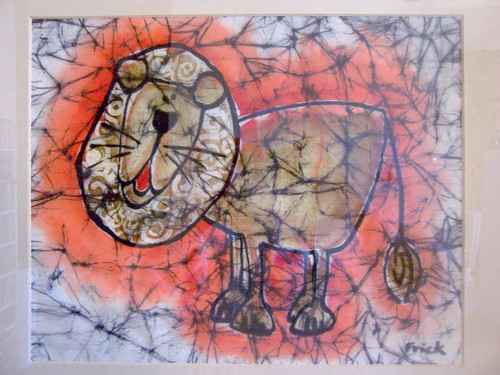But if you say to her, "What's a lion say?" she will roar. Actually, she sort of whispers a roar. In her world, lions are tough, but very polite.
She will also point to the picture of the lion in her book of wild animals. This is a real photograph of an actual lion. Sometime she says "lie-in" and sometime she whisper roars at it. She also has some books that feature drawn lions. Some of them are realistic depictions, and some of them are cartoonish characters that don't really resemble actual lions all that much. They might walk on their hind legs and wear bow ties, for instance.
 |
| From Coco Mault |
So, here is this child who has never seen a lion. She does not know where they live, how they smell, or how big they are. And yet she already has a concept of what a lion is and what a lion does.
She has a mediated reality of lion crafted through the media she consumes.
Bradley Gorham explains in "Stereotypes in the Media: So What?" that "our idea of what is ‘‘real’’ is constructed from the social world around us, a social world that includes different social groups, with different power relations between them, and the media." In other words, the formation of reality is not as simple as looking around at our actual physical surroundings and taking notice of them. Much (perhaps even most) of what we know about the world isn't taken in from our five senses, but by what other people tell us about the world.
Citing Walter Lippman's understanding of how media affects consumers, Gorham goes on to say that "While we have many images about the world, very few of them are actually based on personal experiences. Consequently, much of what we 'know' about the world comes from agreeing with other people that a particular fact is 'true.'"
Think about it. There are plenty of facts that most of us are inclined to agree upon that we have no firsthand knowledge of. I won't dispute that George Washington was the first President of the United States, yet I only have other people's accounts of that to form that idea. If I relied only on my own perceptions, I'd have no way of knowing that George Washington was actually a person at all, let alone that he held that distinctive position. If someone asks me to envision a rainforest, I picture lush vegetation and exotic animal species, but I've never been in a rainforest. I've formulated this understanding through media: images in magazines, documentaries on television, interviews with people who have been there.
*****
I'm saying all of this because I've gotten a lot of pushback over the way that I analyze and respond to media. When I was outraged at Huggies portrayal of dads as incompetent, I was told that I was overreacting. I was told that it was "just a commercial" and that it was "meant to be fun." Many people couldn't see why I was so upset at this tiny piece of the cultural fabric. (Luckily, many of the people who recognized the problematic aspects of Huggies' campaign made sure their voices were heard. Huggies responded by tweaking their campaign in a way that is less stereotypical).
More recently, I've been working to draw attention to some problematic commercials from Kraft MilkBites campaign. After writing a blog post on the topic and starting a Change.org petition, I've gotten much of the same criticism.
After commenting on Kraft's Facebook page, I was told that I was contributing to the "PC culture" that is "killing America."
Someone else said, "There are SO MANY more pressing issues out there. If this is seriously what the world is coming to I'm going to go jump off a tall building. YOU are offending me."
People have told me that I "over think" things and take them "too far." Then they start with all the "justs."
It's just a commercial. It's just a snack bar. It's just a joke.
There is no "just a" piece of media. All those pieces add up. They are all part of the sum total of media pieces that we use to put together our reality. We learn how to think about the world around us from the media we consume. Just like my daughter has processed out some pieces of those images of "lion" to create a reality of what those images mean, we internalize these messages and use them to make decisions about how to react to the world around us. Those decisions include how to treat other people and, yes, how to treat ourselves.
Media messages matter.

I agree - it reminds me of mama nervosa's post about lipstick, feminism, and motherhood from the other day. Those media messages are so pervasive and strong that it is hard for people to dissect, inch by inch, all the half-truths and even blatant falsities perpetuated in the media.
ReplyDeleteI'm writing a series of posts on modesty and the church and talked to my husband about this very thing -- am I being too harsh? am I being too PC (since when in PC "culture" doing more harm than good?)? can't I just not think that hard? We both agreed that those messages, however benign they seem at first, are connected in the web of patriarchy that entangles all that we hear, read, see, and even know.
Too tired tonight to say more than, "Yes." But -- yes.
ReplyDelete